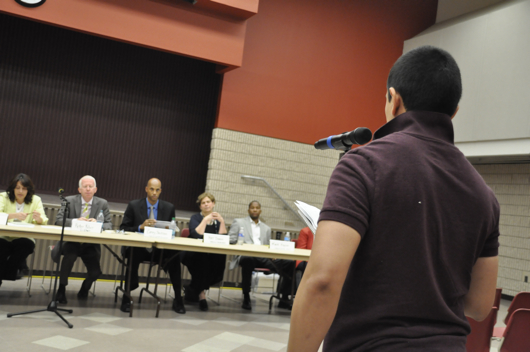Second task force meeting on police interaction draws small crowd

Mason student Adrian Aramayo makes a statement to the university task force about his interactions with university police. Aramayo was one of six speakers at the meeting. (Jake McLernon)
The official university task force formed in early April by President Alan Merten to seek input on “interactions and experiences” with university police held its second open meeting on Wednesday, drawing a lower turnout than the first, and with fewer speakers than the number of people on the task force.
Six speakers spoke to the task force about their experiences with the George Mason University Police Department. Eleven people spoke at the first open meeting. Each speaker was allotted five minutes to make a brief statement.
Between the two sessions, a total of 31 speaking positions were left unfilled.
The task force is composed of 11 members with Peter Pober, chair of the faculty senate, and Rose Pascarell, associate vice president for University Life, as the co-chairs.
“The focus is to get your experiences of university police,” Pober told the small crowd at the open meeting.
Chief of Staff Tom Hennessey said in his e-mail to Mason that the university also hired Tomlinson Strategies, LLC, an external consulting firm specializing in institutional safety, security assessments and law enforcement issues, to “review the police policies and procedures that led to the arrest on a felony chare of student Abdirashid Dahir earlier this month.”
Five students and one faculty member spoke to the committee about their interactions with the police and described specific experiences. While most of the experiences described were negative in their experiences with the police department, the conversation was civil.
The committee received 30 written statements from students, faculty and staff and the statements will be made public after Merten sees the final report in mid-June.
The task force will now gather the feedback from the two open meetings and written statements and compile a preliminary report for May and a final report to give to Merten by mid-June. Depending on the reports, the university will decide if any action should be taken as a result of the task force findings.
Helena Okolicsanyi contributed to this report.
